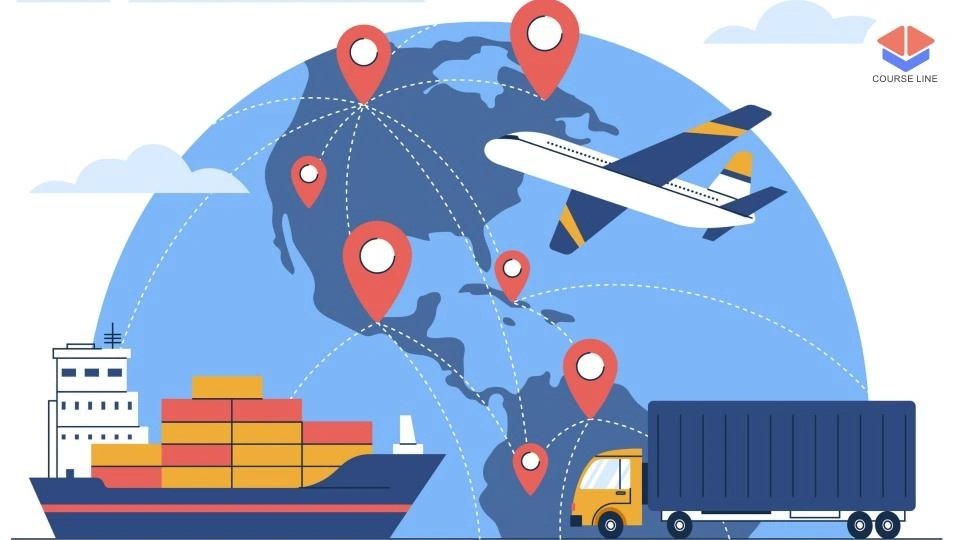Course Features
Price
Study Method
Online | Self-paced
Course Format
Reading Material - PDF, article
Duration
8 hours, 35 minutes
Qualification
No formal qualification
Certificate
At completion
Additional info
Coming soon
- Share
Overview
The Aviation Level 8 Advanced Diploma provides a comprehensive exploration of the aviation industry, combining technical insights, regulatory frameworks, operational knowledge, and managerial principles. From the history and evolution of aviation to the future of space tourism and unmanned aerial systems, this course equips learners with a 360-degree view of modern aviation.
The programme begins with an overview of global aviation, types of aircraft, and international regulatory bodies such as ICAO, EASA, and the FAA. Learners will then dive into advanced subjects such as aerodynamics, aircraft systems, avionics, powerplants, and the intricacies of air traffic control and flight operations. A dedicated module on aviation safety and security explores safety management systems, emergency response planning, risk assessment, and cybersecurity in aviation.
Airport and airline management form another core aspect of the diploma, covering everything from airport planning and environmental concerns to airline economics, fleet management, and marketing strategies. Legal and ethical frameworks in aviation are also addressed, ensuring learners understand passenger rights, international law, and compliance standards.
With sustainability, innovation, and the future of aerospace being increasingly important, the course concludes with modules on emerging technologies, human factors, drones, and the rise of space tourism. Learners complete a capstone project based on current industry challenges, developing real-world solutions through critical analysis and research.
Who is this course for?
The Aviation Level 8 Advanced Diploma provides a comprehensive exploration of the aviation industry, combining technical insights, regulatory frameworks, operational knowledge, and managerial principles. From the history and evolution of aviation to the future of space tourism and unmanned aerial systems, this course equips learners with a 360-degree view of modern aviation.
The programme begins with an overview of global aviation, types of aircraft, and international regulatory bodies such as ICAO, EASA, and the FAA. Learners will then dive into advanced subjects such as aerodynamics, aircraft systems, avionics, powerplants, and the intricacies of air traffic control and flight operations. A dedicated module on aviation safety and security explores safety management systems, emergency response planning, risk assessment, and cybersecurity in aviation.
Airport and airline management form another core aspect of the diploma, covering everything from airport planning and environmental concerns to airline economics, fleet management, and marketing strategies. Legal and ethical frameworks in aviation are also addressed, ensuring learners understand passenger rights, international law, and compliance standards.
With sustainability, innovation, and the future of aerospace being increasingly important, the course concludes with modules on emerging technologies, human factors, drones, and the rise of space tourism. Learners complete a capstone project based on current industry challenges, developing real-world solutions through critical analysis and research.
Requirements
The Aviation Level 8 Advanced Diploma provides a comprehensive exploration of the aviation industry, combining technical insights, regulatory frameworks, operational knowledge, and managerial principles. From the history and evolution of aviation to the future of space tourism and unmanned aerial systems, this course equips learners with a 360-degree view of modern aviation.
The programme begins with an overview of global aviation, types of aircraft, and international regulatory bodies such as ICAO, EASA, and the FAA. Learners will then dive into advanced subjects such as aerodynamics, aircraft systems, avionics, powerplants, and the intricacies of air traffic control and flight operations. A dedicated module on aviation safety and security explores safety management systems, emergency response planning, risk assessment, and cybersecurity in aviation.
Airport and airline management form another core aspect of the diploma, covering everything from airport planning and environmental concerns to airline economics, fleet management, and marketing strategies. Legal and ethical frameworks in aviation are also addressed, ensuring learners understand passenger rights, international law, and compliance standards.
With sustainability, innovation, and the future of aerospace being increasingly important, the course concludes with modules on emerging technologies, human factors, drones, and the rise of space tourism. Learners complete a capstone project based on current industry challenges, developing real-world solutions through critical analysis and research.
Career path
The Aviation Level 8 Advanced Diploma provides a comprehensive exploration of the aviation industry, combining technical insights, regulatory frameworks, operational knowledge, and managerial principles. From the history and evolution of aviation to the future of space tourism and unmanned aerial systems, this course equips learners with a 360-degree view of modern aviation.
The programme begins with an overview of global aviation, types of aircraft, and international regulatory bodies such as ICAO, EASA, and the FAA. Learners will then dive into advanced subjects such as aerodynamics, aircraft systems, avionics, powerplants, and the intricacies of air traffic control and flight operations. A dedicated module on aviation safety and security explores safety management systems, emergency response planning, risk assessment, and cybersecurity in aviation.
Airport and airline management form another core aspect of the diploma, covering everything from airport planning and environmental concerns to airline economics, fleet management, and marketing strategies. Legal and ethical frameworks in aviation are also addressed, ensuring learners understand passenger rights, international law, and compliance standards.
With sustainability, innovation, and the future of aerospace being increasingly important, the course concludes with modules on emerging technologies, human factors, drones, and the rise of space tourism. Learners complete a capstone project based on current industry challenges, developing real-world solutions through critical analysis and research.
-
- History and Evolution of Aviation 00:10:00
- Overview of the Global Aviation Industry 00:10:00
- Aviation Organizations and Regulatory Bodies (e.g., ICAO, EASA, FAA) 00:10:00
- Types of Aircraft and Their Roles 00:10:00
- Current Trends and Future Developments in Aviation 00:10:00
-
- Principles of Flight and Aerodynamics 00:10:00
- Aircraft Components and Their Functions 00:10:00
- Powerplants and Propulsion Systems 00:10:00
- Avionics and Aircraft Navigation Systems 00:10:00
- Aircraft Maintenance and Inspection Procedures 00:10:00
- Air Traffic Control Systems and Procedures 00:10:00
- Airspace Classification and Management 00:10:00
- Flight Planning and Route Optimization 00:10:00
- Communication Protocols in Aviation 00:10:00
- The Role of Meteorology in Flight Operations 00:10:00
- Airport Planning and Design 00:10:00
- Airport Operations and Ground Handling 00:10:00
- Passenger and Cargo Management 00:10:00
- Sustainability and Environmental Concerns in Airports 00:10:00
- Financial Management in Airport Operations 00:10:00
- Introduction to International Aviation Law 00:10:00
- Regulations for Airline and Pilot Certification 00:10:00
- Legal Issues in Airport Management 00:10:00
- Passenger Rights and Consumer Protection in Aviation 00:10:00
- Ethical Considerations in Aviation Operations 00:10:00
- Conducting Research in Aviation 00:10:00
- Data Analysis and Report Writing 00:10:00
- Identifying Emerging Challenges in Aviation 00:10:00
- Developing Solutions for Industry Problems 00:10:00
- Capstone Project Presentation and Evaluation 00:10:00
- Premium Certificate 00:15:00

No Reviews found for this course.
Is this certificate recognized?
Yes, our premium certificate and transcript are widely recognized and accepted by embassies worldwide, particularly by the UK embassy. This adds credibility to your qualification and enhances its value for professional and academic purposes.
I am a beginner. Is this course suitable for me?
Yes, this course is designed for learners of all levels, including beginners. The content is structured to provide step-by-step guidance, ensuring that even those with no prior experience can follow along and gain valuable knowledge.
I am a professional. Is this course suitable for me?
Yes, professionals will also benefit from this course. It covers advanced concepts, practical applications, and industry insights that can help enhance existing skills and knowledge. Whether you are looking to refine your expertise or expand your qualifications, this course provides valuable learning.
Does this course have an expiry date?
No, you have lifetime access to the course. Once enrolled, you can revisit the materials at any time as long as the course remains available. Additionally, we regularly update our content to ensure it stays relevant and up to date.
How do I claim my free certificate?
I trust you’re in good health. Your free certificate can be located in the Achievement section. The option to purchase a CPD certificate is available but entirely optional, and you may choose to skip it. Please be aware that it’s crucial to click the “Complete” button to ensure the certificate is generated, as this process is entirely automated.
Does this course have assessments and assignments?
Yes, the course includes both assessments and assignments. Your final marks will be determined by a combination of 20% from assignments and 80% from assessments. These evaluations are designed to test your understanding and ensure you have grasped the key concepts effectively.
Is this course accredited?
We are a recognized course provider with CPD, UKRLP, and AOHT membership. The logos of these accreditation bodies will be featured on your premium certificate and transcript, ensuring credibility and professional recognition.
Will I receive a certificate upon completion?
Yes, you will receive a free digital certificate automatically once you complete the course. If you would like a premium CPD-accredited certificate, either in digital or physical format, you can upgrade for a small fee.
Course Features
Price
Study Method
Online | Self-paced
Course Format
Reading Material - PDF, article
Duration
8 hours, 35 minutes
Qualification
No formal qualification
Certificate
At completion
Additional info
Coming soon
- Share
Barbering Level 5 Advanced Diploma
Course Line246£490.00Original price was: £490.00.£14.99Current price is: £14.99.Complete Technical Analysis for Stock and Crypto Trading: Master Market Strategies
Course Line238£490.00Original price was: £490.00.£14.99Current price is: £14.99.





